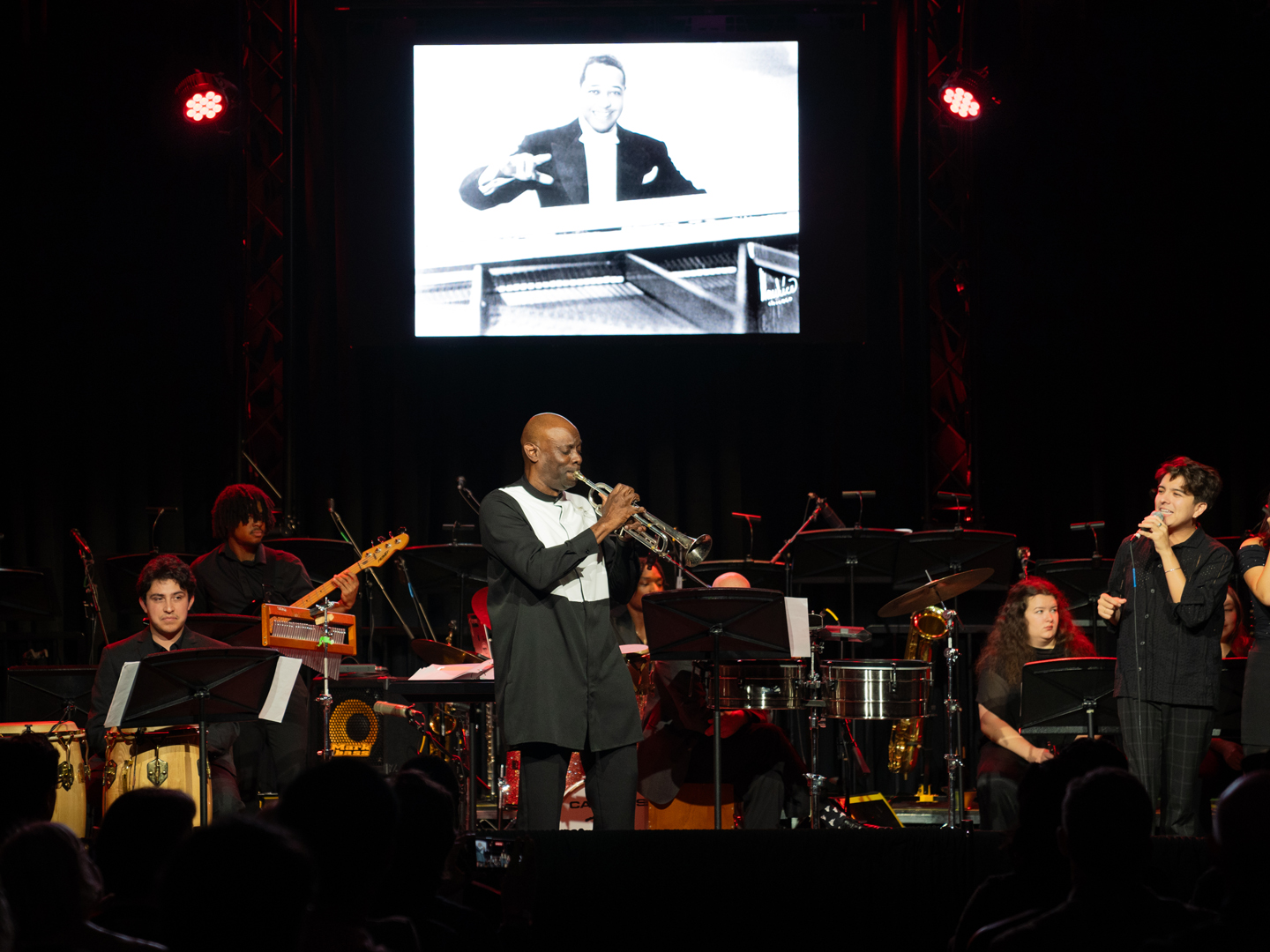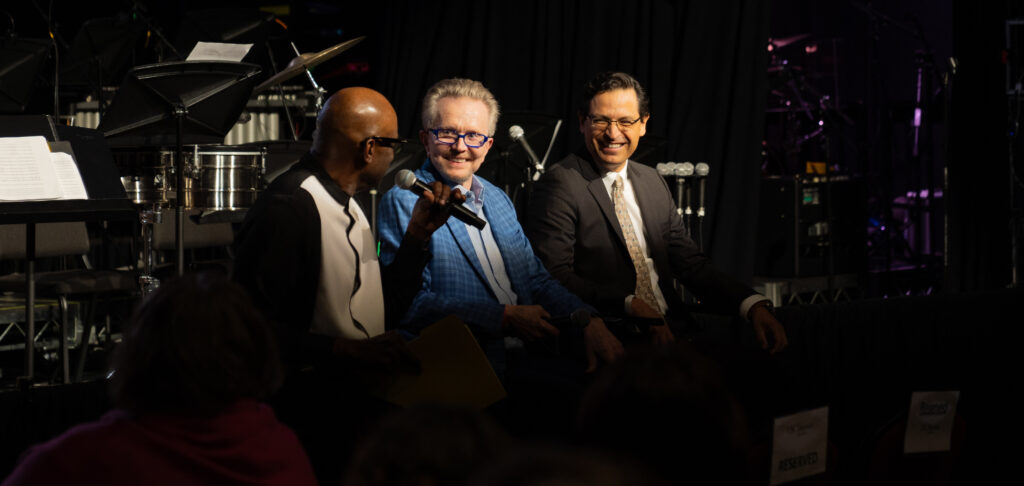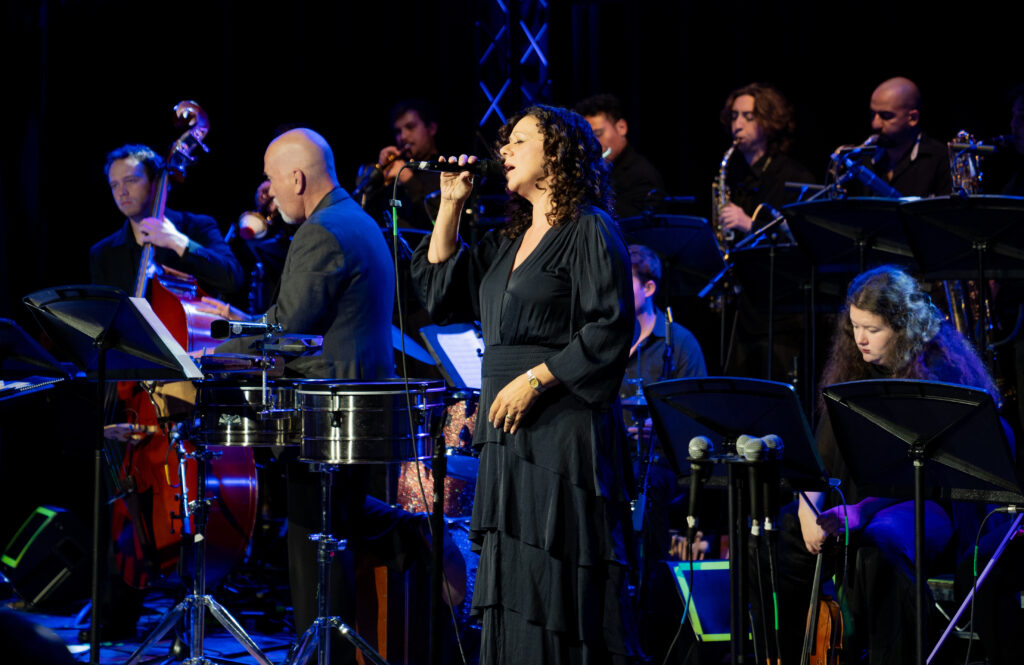
Rockin’ in Rhythm: Re-Imagining the Music of Duke Ellington
By Elizabeth Farrington
Students and faculty from across Thornton celebrate an American master with genre-defying arrangements from his classic songbook.
Duke Ellington: jazz icon, pianist, composer, band leader, diplomat. Ellington is an artist beyond categorization whose music transcended musical and political boundaries, garnering a worldwide audience. With a catalogue of over 200 albums and 1,000 compositions, his expansive discography continues to influence modern musicians. On Oct. 28, 2024, for the 125th anniversary of his birth, the USC Thornton School of Music paid tribute to this groundbreaking artist by reinterpreting his work through a modern lens with “Rockin’ in Rhythm: Re-Imagining the Legacy of Duke Ellington.” In tandem with USC Thornton’s “Quincy Jones: Beyond Category” event series, celebrating the expansive impact of the aforementioned artist on the world of music, film and philanthropy, McCurdy aspired to create an event showcasing the impressive range of Thornton’s student body and their interests.
“Imitation is a kiss of death. You can pay homage to [Ellington] by doing their music, but not trying to do it like they did it,” said Ron McCurdy, professor of jazz studies and the event’s curator and producer. Rather than present a traditional recital of Ellington’s works, the concert presented modern interpretations of his vast library of music alongside a scholarly panel discussion featuring McCurdy, USC Thornton musicology faculty member León F. García Corona and John E. Hasse, Curator Emeritus of American Music of the National Museum of American History at the Smithsonian. The concert served not only to frame the times in which the composer lived, but reinterpreted these masterworks through a fusion of a myriad of popular music genres. This meant tributes, improvisations and dynamic genre-mixing performances in honor of the American master.
Raised in Washington D.C. just after the turn of the 20th century, Duke Ellington gained prominence as a band leader at New York City’s Cotton Club in the 1930s. Veronica Ratliff (V.C.R), a master’s student in composition and one of the event’s performers, admired Ellington’s work ethic amidst a racially segregated music industry: “Ellington really came up at a time when odds were stacked against him. He paved the way for so many. He and his contemporaries were redefining blackness.” Originally known as ‘Duke Ellington and his Jungle Band’ and later ‘Duke Ellington and the Washingtonians,’ his music addressed racial divisions while popularizing jazz music worldwide.
Many of Ellington’s compositions not only became jazz standards, but defined American songwriting. Songs such as “In A Sentimental Mood” and “Mood Indigo” were honored through compelling student-faculty collaborative performances. On the latter, jazz studies students Jade Bacon provided vocals over Denali Kauffman’s arrangement, channeling the intimate style of Ella Fitzgerald in her version of the standard.
“Take the A Train,” arranged by sophomore Julian Najah, featured narrative verses describing Ellington’s upbringing and career from rapper Theory (Music Teaching & Learning doctoral student, Daniel Simmons): “Sophisticated ladies they gonna break down/Cotton Club jumping watch ‘em switch the sound.” With both Ellington’s career and hip-hop originating in New York City, this jazz/rap crossover was a fitting tribute for the musical legend.
Inspired by Quincy Jones’ multi-genre collaborations, McCurdy handpicked Theory to perform at the event. He was particularly inspired by Jones’ 1988 album Back on The Block, where popular musicians combined jazz standards with hip-hop. McCurdy saw Quincy Jones as a successor to the ‘beyond category’ philosophy of Duke Ellington’s music, and hoped to connect both legacies through the song’s rendition.
At the panel discussion, assistant professor of musicology León F. García Corona emphasized Ellington’s status not only as a musician but as an emissary of American popular music. In the mid-20th century, Ellington was a ‘jazz ambassador’ who represented the United States on state-sponsored trips to Latin America. In 1968, Ellington visited Mexico, Ecuador and Brazil to perform and compose songs inspired by his travels. These performances portrayed the United States as an inclusive society during a fractious time when the nation addressed ongoing protests against the Vietnam War. Ellington’s music embodied the best of what America aspired to be.

“The Lake,” arranged by doctoral student Ennis Harris (MM ‘22), reflected the lasting musical impact of Spanish culture on Ellington’s music. From the podium, Harris described being influenced by Argentinain composer Astor Piazolla for the arrangement. He told the audience he admired that both Piazolla and Ellington had “a genreless approach to music and composition.” The result was a “tango-fied” reimagining of the song, demonstrating the endurance of Ellington’s ‘beyond category’ philosophy.
Duke Ellington’s sacred music was also highlighted during the event. His religious upbringing motivated him to compose the Concert of Sacred Music, three bodies of work influenced by the New Testament. Despite the work’s roots in Christian liturgical music, Ellington held performances of these works in Catholic churches and synagogues across America in the late 1960s to reach a wide audience. His motivation stemmed from his belief that “men praise in many languages but there is no language that God does not understand.”
Veronica Ratliff (V.C.R) arranged and performed “Come Sunday,” originally by Duke Ellington and vocalist Mahlia Jackson for Black, Brown and Beige, a suite written in 1943. A string quartet accompanied Ratliff’s moving vocals, honoring both the religious aspects of Ellington’s career and elevating his personal journey as a musician.
After being introduced to the song by McCurdy, Ratliff jumped at the opportunity to honor both Ellington and Jackson: “That cross-genre essence and excellence made ‘Come Sunday’ the perfect song for me to compose,” said Ratliff of her song selection. Despite having to trim three songs from the show, McCurdy ensured that Ellington’s religious compositions were highlighted to emphasize his variety as a composer: “Very few of his contemporaries had that kind of bandwidth to write in such a dynamic way.”
The event concluded with a rousing performance of Ellington’s big band classic, “Rockin’ in Rhythm” by ALAJE, USC Thornton’s Afro-Latin jazz ensemble led by faculty member and percussionist Aarón Serfaty. A combination of group vocals with layered strings and horns made for a jubilant rendition of the event’s namesake. The closing performance reminded the audience of the unity Ellington advocated for through advocacy, diplomacy and his everlasting songs.
When asked why Duke Ellington still connects with audiences today, McCurdy attested to the pure quality of his music: “Duke said it best, there’s only two kinds of music: Good music and bad music. And the bad music will not hold up.” Thornton’s tribute to one of America’s master composers reminds audiences that 125 years later, Ellington’s work endures for its boundless imagination and inspiration for generations of artists and listeners to come.

Written by Elizabeth Farrington, USC Dornsife College of Arts & Letters political science major and student journalist on assignment for the USC Thornton Office of Communications. Featured photo by USC Dornsife political science major Mallory Snyder.

